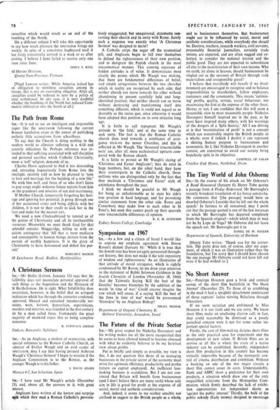Sot,—I have read Mr Waugh's article (December 23), and, above
all, the answers to it, with great interest.
Anglicans have written of the horror and surprise kith which they read a Roman Catholic's proyoca-
tively exaggerated, but unequivocal, statements con- cerning their church and its unity with Rome. Surely such a response was exactly what 'A Christmas Sermon' was designed to incite?
A Catholic strips the sugar off the ecumenical pill, and Anglicans begin to fall over themselves to defend the righteousness of their own position, and to denigrate the Popish church in the most unecumenical manner. This cunning exposure of hidden attitudes is of value. It demonstrates most clearly the points which Mr Waugh was making, that there are fundamental differences of belief, and simple antagonisms between the two churches which in reality are recognised by each side; that neither church can move towards the other without abandoning its present carefully held and long- cherished position; that neither church can so move without destroying and transforming itself into something different, which it could not regard as so desirable as the status quo, since otherwise it would have adopted that position on its own initiative long ago.
It is futile to call repugnant Mr Waugh's attitude to 'the fold,' and at the same time to seek unity. The fact is that the Roman Catholic church does tend towards a semblance of arro- gance vis-h-vis the newer Churches, and this is reflected in Mr Waugh. The 'thousand irreconcilable sects' are, after all, mere ecclesiastical upstarts com- pared with the Roman church.
It is futile to protest at Mr Waugh's slating of 'Christmas and Easter Anglicans'; they do exist in huge numbers, but, on the other hand, they have their counterparts in the Catholic church, those millions who are distinguished only by the fact that they maintain a 'Christmas and Easter' style of attendance throughout the year.
I think we should be grateful to Mr Waugh for being so unfashionable as to state his side's true position in hard language, and for provoking similar statements from the other side. Rome and Canterbury may make love to each other in St Peter's, but even this cannot patch up their quarrels over irreconcilable differences of opinion.


































 Previous page
Previous page